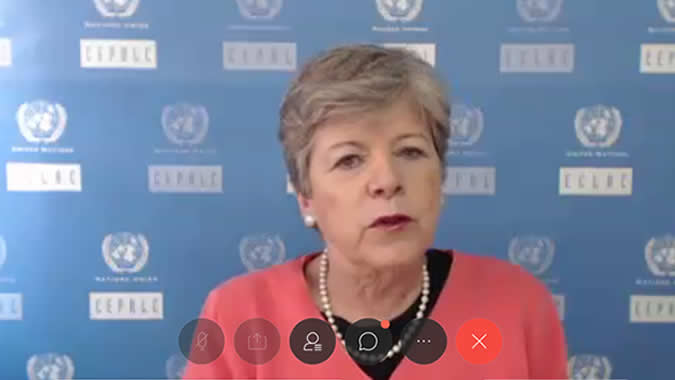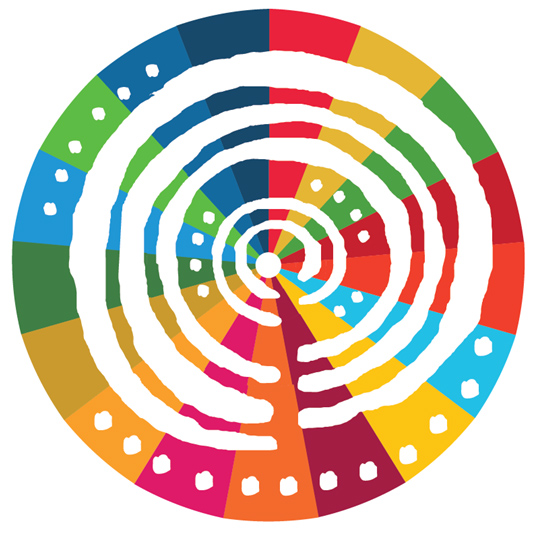Alicia Bárcena Calls for Rethinking the Model and Consolidating the Economic, Social and Environmental Dimensions of Sustainable Development so as to Leave No One Behind
Work area(s)
ECLAC’s Executive Secretary met today with members of civil society from Latin America and the Caribbean, where she stressed the region’s commitment to implementing the 2030 Agenda along with the importance of fulfilling it despite the challenges imposed by the COVID-19 pandemic.

The pandemic caused by COVID-19 has exposed the economic model’s structural problems and the failings of social protection systems and welfare schemes. Hence, a “new normality” is not the way forward; we must rethink the development model and consolidate the economic, social and environmental dimensions of sustainable development, leaving no one behind, Alicia Bárcena, Executive Secretary of the Economic Commission for Latin America and the Caribbean (ECLAC), sustained today.
The senior United Nations official held a virtual meeting with members of civil society from Latin America and the Caribbean. Participating in the event along with Alicia Bárcena was Javier Surasky, coordinator of the Governance for Development Area at the Center for International Strategic Thinking (Centro de Pensamiento Estratégico Internacional, Cepei). Meanwhile, Marita González and Ricardo Baruch – members of the Liaison Committee of the Civil Society Participation Mechanism in the Sustainable Development Agenda and in the Forum of the Countries of Latin America and the Caribbean on Sustainable Development – spoke on behalf of civil society.
During the meeting, 210 participating representatives of civil society expressed their concerns regarding the challenges the region faces in terms of guaranteeing the rights and autonomy of women, migrant and displaced people, children, adolescents and youth, indigenous and Afro-descendant peoples, persons with disabilities, and older adults, among other groups.
In her remarks, Alicia Bárcena stressed the region’s commitment to implementing the 2030 Agenda, along with the importance of fulfilling it despite the challenges imposed by the COVID-19 pandemic.
“In light of the growing difficulties that Latin American and Caribbean countries must contend with in this context of crisis, today more than ever, the 2030 Agenda is our collective and pressing road map. Supporting its implementation, as well as the follow-up and monitoring of progress on achieving the Sustainable Development Goals (SDGs) in the medium and long term, in each and every one of our countries, is a great challenge that we will have to tackle in this period of pandemic. Harmonizing the planning to achieve the SDGs with the emergency plans linked to COVID-19 is a goal that we can only achieve by acting together, all of the stakeholders in sustainable development,” she emphasized.
ECLAC’s Executive Secretary noted that, along this path, participation mechanisms are very important. “We do not want two monologues but rather a dialogue. We must promote this dialogue with the countries of the region, with governments, companies and all sectors of civil society,” she said.
She added that the current crisis, along with the inequalities and structural failings that it has left exposed, call on us to make progress on implementing the SDGs and to fulfill the vision that the 2030 Agenda sets forth for a more just and egalitarian world, with greater environmental sustainability.
Alicia Bárcena recalled that before the pandemic, Latin America and the Caribbean had recorded seven years of slow growth with rising rates of poverty, extreme poverty and inequality, limited fiscal policy space, and burgeoning social conflicts.
She specified that estimates point to the pandemic’s effects producing the biggest recession experienced by the region since 1914 and 1930, with growth projected at -5.3%, a significant deterioration in labor indicators in 2020 that is seen leaving nearly 12 million more people unemployed in the region, and an increase of nearly 30 million people living in poverty.
Therefore, she said, it is urgent that governments ensure immediate temporary cash transfers to meet basic needs and sustain household consumption, which will be crucial for achieving a solid and relatively quick reactivation.
ECLAC proposes providing a basic emergency income (BEI) equivalent to one poverty line (the per capita cost of acquiring a basic food basket and meeting other basic needs) over the course of six months to the entire population living in poverty in 2020 (meaning 215 million people, or 34.7% of the region’s population). This would entail additional spending of 2.1% of GDP to reach all the people who will find themselves in situations of poverty this year.
The United Nations regional commission’s highest authority added that ECLAC’s strategic proposal is aimed at attaining a welfare State based on a new social, fiscal and production-related compact as well as universal social protection systems, to avert another lost decade.
She also warned about the importance of having space to expand taxation for short- and medium-term policies. In that sense, she underscored that tax evasion and avoidance, which amounts to 6.3% of regional GDP, is equivalent to half of central governments’ social spending, and 3 times the spending needed to cover all the people who will find themselves in situations of poverty in 2020 over a six-month period. In addition, it is higher than average spending by central governments on education (4%) and health (2.2%).
“We need universal social protection systems with a rights-based approach, strategies for labor inclusion, and above all we need to overcome the fragmentation, hierarchical organization and commodification of health systems. This will undoubtedly necessitate a social compact,” she affirmed.
She stressed that COVID-19 is a major wake-up call regarding the production and consumption model.
“We have to be careful not to solve the economic crisis at the expense of the environment. If we continue degrading the planet, climate change will be our next big problem,” she warned.
Finally, Alicia Bárcena highlighted the initiatives that the Commission has developed to take prompt action regarding COVID-19’s socioeconomic impact in Latin America and the Caribbean: the Gateway for Follow-up on the Sustainable Development Goals (SDG Gateway), which is the result of a joint effort by the United Nations System in the region; the COVID-19 Observatory in Latin America and the Caribbean; and the three special reports produced by ECLAC on the pandemic’s socioeconomic impact in the region.
Related link(s)
Country(ies)
- Latin America and the Caribbean
Contact
Public Information Unit
- prensa@cepal.org
- (56 2) 2210 2040
